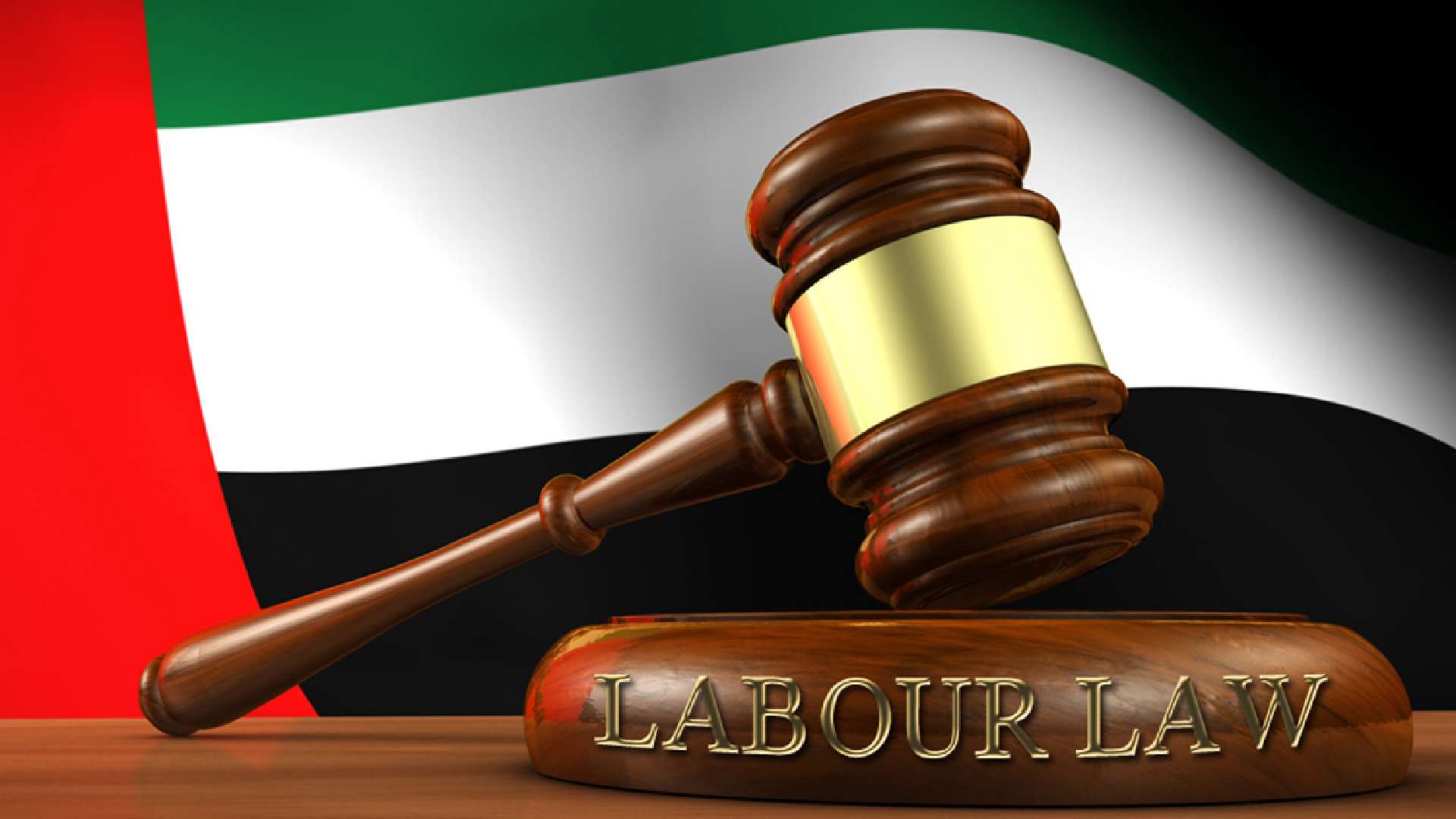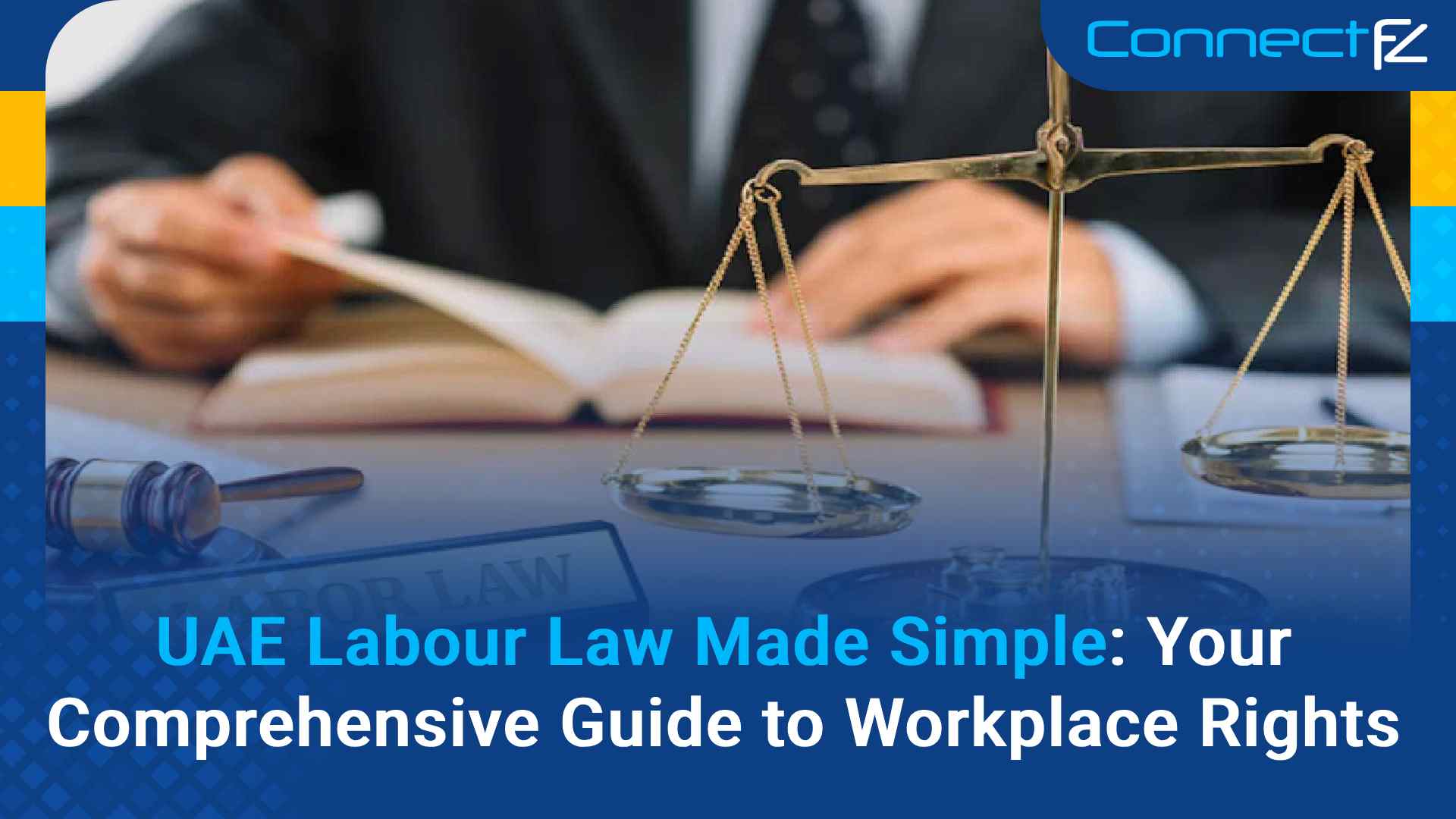The groundbreaking labour law UAE, ushered in on February 2, 2022, sweeps away the antiquated Federal Law No. 8 of 1980. Heralding a new era in private-sector employment dynamics. Bursting with innovation, it revolutionizes work structures by embracing part-time, temporary, and flexible arrangements. Moreover, it boldly refines visa classifications and imposes stringent penalties for workplace transgressions. A mesmerizing addition is the forthcoming unemployment insurance initiative slated for 2023, promising to cushion workers with 60% of their base pay during joblessness.
In this article reform weaves a tapestry of modernization, safeguarding the rights of employers and employees. While fostering a harmonious and adaptable work experience across the UAE.
Understanding UAE Labour Law Basics

Dive into the intricate realm of the labour law UAE, a cornerstone governed by Federal Law No. 8 of 1980 shaping employment dynamics in the United Arab Emirates. Let us unravel the complexities with a burst of insight:
- Coverage and Exemptions:
– Initially, the law shields all employees, encompassing UAE nationals and expatriates, while exempting specific groups like armed forces and domestic servants.
- Gratuity and Termination:
– Transitioning to gratuity, Article 120 intricately calculates based on tenure and final salary.
– Moreover, Article 121 delves into post-termination settlements, covering outstanding wages and gratuity intricacies.
- Sick Leave and Working Hours:
– Delving into sick leave entitlements, employees receive full pay aligned with their service duration.
– Additionally, stringent limits on working hours ensure a balanced life, capping daily hours at eight and weekly at 48.
- Visa Cancellation and Leave Salary:
– Employers navigate visa cancellations post-contract closure following precise guidelines.
– Employees bask in the assurance of regular salary during annual leave periods as per legal mandates.
- Notice Period and Employment Contracts:
– Noteworthy are defined notice periods tailored to contract type and service duration for seamless employment closures.
– Concluding, written employment contracts stand as a mandatory beacon for all UAE employees, fostering clarity while disallowing implied terms.
Employee Rights and Responsibilities
Employee Rights:
- Employment Contract: To commence this immersive journey, begin with the foundational right to a written employment contract. Unveiling essential terms such as salary, working hours, leave entitlements, and notice period.
- Working Hours: Transitioning through the labyrinth, standard working hours are fixed at 8 hours per day or 48 hours per week. Offering adaptability during Ramadan or in specific industries.
- Overtime Pay: Delve deeper into entitlements as employees are granted overtime pay ranging from 25% to 50% of their regular hourly wage for exceeding standard hours.
- Annual Leave: Continuing the journey, employees can indulge in a minimum of 30 calendar days of annual leave after one year of service. Extending to 45 days for longer tenures.
- Sick Leave: Further into complexities, employees can access sick leave with full pay for up to 90 days annually upon presenting a medical certificate.
- End-of-Service Benefits: Ascend to the peak were completing one year of service rewards employees. With end-of-service benefits (EOSB) like gratuity payments based on their tenure.
Employee Responsibilities:
- Performing Work: Embark on the odyssey with the responsibility to execute assigned tasks under employer supervision and control as stipulated in the contract.
- Professional Conduct: Progress further by showcasing good behavior, honesty, integrity. Also, safeguarding business confidentiality acquired during employment.
- Safety Compliance: Navigate through essential safety protocols crucial for employee well-being by adhering to occupational health instructions set by the establishment.
- Work Diligently: Forge ahead as employees are expected to work diligently, refine professional skills, and elevate performance for mutual benefit.
- No Conflict of Interest: Finally, steer clear of perilous paths by refraining from engaging in activities that conflict. With laws or disclosing confidential business information.
Rights guaranteed to employees under UAE Labour Law
Dive into the intricate realm of employee rights safeguarded by labour law UAE, where a tapestry of provisions weaves a complex yet vital fabric for workplace harmony.
- Standard working hours stand at 8 per day or 48 per week, with provisions for overtime pay. After a year of service, annual leave commences at 30 days.
- Sick leave with full pay extends to 90 days annually.
- Maternity benefits cater to female employees, while end-of-service gratuity reflects tenure.
- Mandates for workplace safety and non-discrimination further enrich this regulatory landscape.
1. Right to fair treatment and non-discrimination
Delve into the intricate web of employee rights and employer obligations within the labour law UAE landscape.
Employers are bound by a tapestry of regulations dictating the creation of a secure work environment, equitable remuneration, and unbiased practices. The nation’s unwavering commitment to workers’ rights is palpable through a legal framework not only warding off unjust practices but also championing workplace equality.
Recent shifts in legislation, epitomized by Federal Law No. 33 of 2021, showcase stipulations like banning harassment. Moreover, ensuring parity in gender pay, and enhancing working conditions.
Consequently, employers find themselves tasked with effectively disseminating these alterations, revising contracts. Also, adhering to fresh statutory demands to cultivate a cohesive work milieu that cherishes employee entitlements and nurtures equity.
2. Right to timely payment of wages
Embark on a labyrinthine journey through the intricate realm of wage rights in the UAE. The foundational principle of timely wage payment is paramount, compelling employers to meticulously deliver salaries in accordance with labour law UAE. Violations risk severe penalties under the watchful eye of recent statutes like Federal Law No. 33 of 2021.
Venturing into the realm of the Wage Protection System (WPS) reveals a complex mechanism orchestrating the seamless transfer of salaries. Nurturing compliance and fortifying professional bonds. This intricate system not only boosts productivity but also cultivates a harmonious work environment by ensuring punctual wage disbursements to employees.
3. Right to safe working conditions
- Embark on a complex exploration of the cornerstone of safe working conditions in the UAE, a fundamental pillar of employee rights. Employers bear the weighty responsibility of curating a secure work environment, shielding against perils that may precipitate occupational harm or maladies.
- This unwavering commitment to occupational health and safety mirrors the burgeoning workforce in the UAE. Moreover, accentuating the criticality of fortified Occupational Health and Safety (OHS) protocols to deftly navigate workplace hazards.
4. Right to leaves and holidays
Employees in the UAE are granted rights to leaves and holidays in accordance with new labour law UAE. They have entitlements to annual, sick, maternity/paternity, and bereavement leave. Additionally, public holidays are recognized with full pay. Employers are required to comply with these regulations to support their workforce effectively and meet legal obligations.
5. Right to end-of-service benefits (gratuity)
- Dive into the intricate realm of end-of-service benefits, known as gratuity or severance pay, a pivotal financial entitlement enshrined in UAE labor law. This crucial provision not only safeguards employee rights but also acts as a financial cushion in the tumultuous event of job termination.
- Employers meticulously calculate gratuity, factoring in the employee’s basic salary and tenure, with precise entitlements delineated for different service durations. Moreover, weaving a complex tapestry of financial security and legal compliance.
Responsibilities of employees towards their employers
- Employees bear significant responsibilities towards their employers, as outlined in labor laws and workplace standards. They are expected to diligently perform tasks, adhere to schedules, prioritize safety, follow rules, maintain confidentiality, and meet contractual obligations.
- Moreover, employees must respect instructions, contribute skills, and cultivate positive relationships through loyalty, honesty, and professionalism.
1. Fulfilling job duties and responsibilities
- Fulfilling job duties involves meeting obligations tied to specific roles, often requiring sacrifice and adherence to rules. On the other hand, responsibilities offer autonomy and align with personal values, leading to rewards.
- Conversely, employees must perform tasks diligently, prioritize safety, and maintain confidentiality to foster a productive work environment.
2. Following company policies and procedures
- Explore the complex organizational dynamics where adherence to company policies ensures operational efficiency and regulatory compliance. Moreover, these principles foster consistency, professionalism, and clear expectations.
- Employees navigate structured roles by optimizing resources and minimizing legal risks. Effective leadership emphasizes policy compliance, nurturing a culture that values adherence and employee engagement.
3. Maintaining confidentiality and loyalty
- Embark on a mesmerizing odyssey through the intricate fabric of workplace ethics, where the stalwarts of confidentiality and loyalty emerge as sentinels of trust and moral resilience.
- Safeguarding confidentiality demands an unwavering shield over delicate data, a profound reverence for privacy. Also, meticulous adherence to established protocols protecting individual rights.
- Loyalty, a guiding light of steadfast dedication, necessitates upholding sacred vows of confidentiality. Moreover, shielding the treasures of proprietary wisdom, and embodying the very essence of the organization’s ethos.
- These foundational principles not only fortify the bedrock of organizational integrity. But also sow the seeds for enduring allegiance in a harmonious work environment teeming with vibrancy and unwavering commitment.
Employer Obligations and Regulations
Employers are mandated to ensure workplace safety and legal compliance by providing a secure environment, hazard information. Also, safety training, injury records, protective gear, and reporting incidents to authorities like OSHA.
Moreover, prohibiting retaliation against employees for exercising their rights is crucial. Understanding and fulfilling these duties is vital for maintaining a safe, lawful workplace.
Obligations of employers under UAE Labour Law
Employers in the UAE are bound by the new labor law, Federal Law No. 33 of 2021, which outlines their obligations. These include:
- Maintaining employee records
- Providing suitable accommodation or housing allowance
- Establishing work organization rules
- Investing in employee training
- Ensuring medical insurance coverage
- Offering termination benefits
- Providing air tickets for repatriation
- Enforcing health and safety measures in the workplace.
1. Providing a safe work environment
- Employers are legally required to provide a safe work environment for their employees. This entails ensuring the workplace is free from known health and safety hazards, complying with safety standards and regulations.
- Providing necessary safety equipment, offering safety training in a language employees understand, maintaining accurate records of work-related injuries and illnesses. Also, refraining from retaliating against workers who exercise their rights under the law.
2. Ensuring timely payment of wages
- Dive into the intricate realm of employer responsibilities where the imperative of ensuring punctual wage disbursement to employees unfolds. This mandate encompasses strict adherence to federal and state statutes like the Fair Labor Standards Act (FLSA) and region-specific guidelines dictating payment timelines.
- Employers must expeditiously remit wages on scheduled paydays for the relevant work cycle, encompassing accrued overtime. Moreover, without unwarranted delays or transgressions of minimum wage and overtime stipulations.
3. Issuing clear employment contracts
- Employers must provide clear, detailed employment contracts to define job roles, compensation, benefits, rules, confidentiality, dispute resolution, and termination terms. These contracts establish mutual understanding and legal protection for both parties.
- Moreover, clarity in agreements is vital for navigating work relationships effectively and ensuring compliance with rights and obligations.
4. Complying with working hour regulations
- Employers are obligated to comply with working hour regulations to ensure adherence to federal and state laws governing employee work hours.
- These regulations specify how, when, and how much employees should be paid, including overtime rates, break time requirements. Recordkeeping, and compliance with the Fair Labor Standards Act (FLSA) and other relevant laws.
Legal consequences for employers who violate UAE Labour Law
Employers breaching labour law UAE face severe repercussions, including fines up to 50,000 DHS, potential jail terms. Moreover, employee deportation for permit violations, and liabilities for work permit and visa breaches.
Employers must cover recruitment costs, permits, visas, medical exams, and ensure compliance to avoid fines, imprisonment, wage responsibilities, and permit bans.
Termination and Resignation
- Delve into the intricate realm of workforce dynamics where termination and resignation emerge as contrasting facets of employment processes.
- Termination, orchestrated by the employer, signifies the conclusion of the professional bond, while resignation, a voluntary act by the employee, marks their departure. The crux lies in the initiator of the employment cessation.
Procedures and regulations for terminating employment contracts
Embark on a labyrinthine journey through the intricate realm of terminating employment contracts, where a myriad of crucial elements intertwines. Employers are tasked with meticulous adherence to contract stipulations, encompassing notice periods, termination grounds, and jurisdiction-specific legal nuances.
Furthermore, they must craft a termination missive, orchestrate a cessation meeting, uphold employee rights. Also, ensure alignment with equitable dismissal criteria to sidestep legal ramifications.
Employee rights and entitlements upon termination
- Embark on a whirlwind exploration of the intricate tapestry of employee rights post-termination, where an excess of entitlements awaits in the aftermath of job loss.
- These benefits range from the continuation of health coverage via COBRA to receiving final pay, potential severance options. Moreover, eligibility for unemployment benefits, and protections against unjust dismissal or discriminatory firing.
- Understanding these entitlements is paramount for employees to deftly navigate the complexities of job loss. Ensuring their rights remain safeguarded amidst the tumultuous seas of employment transitions.
Resignation process and notice periods
When navigating the resignation process, it is common practice to give a two-week notice, even though not legally required. The resignation letter should explicitly outline the decision to depart, the notice period, and the ultimate day of work. Employers can discuss extending this period if necessary.
Ensuring a professional approach to resignations, showing respect to departing employees, facilitating smooth handovers. Moreover, understanding legal considerations, delegating tasks appropriately, and promptly informing other team members are all critical components of effectively managing resignations.
Common Misconceptions and FAQs

Dive into a whirlwind exploration of prevalent misconceptions spanning diverse realms. From the fallacy of science being dull to the myths encircling vaccines, these sources unravel common misunderstandings.
Delving deeper, they debunk misconceptions in group counseling, emphasizing the essence of a secure space for open dialogue and constructive feedback. The overarching goal is to dispel these fallacies, shed light on various subjects. Also, cultivate a deeper comprehension of the realities behind widespread myths and misinterpretations.
What is the latest Labor Law in UAE?
This updated legislation introduces significant changes impacting private sector companies and employees, covering fixed-term contracts. Also, anti-discrimination policies, equal pay standards, flexible work options, final entitlements, record-keeping requirements, penalties, and compliance guidelines.
Do I need to pay if I resign in UAE?
- Within the realm of UAE employment, should you resign without fulfilling the required notice period outlined in your contract, you might face a scenario where your employer requests compensation, termed ‘payment in lieu of notice.’ This compensation mirrors your earnings for the entire or remaining notice period.
- However, once you have successfully completed your probationary period and are in the process of serving your notice.
- Furthermore, certain circumstances permit immediate resignation without the obligation to compensate your employer. Certainly, particularly when departing for reasons specified in Article 45 of the law.
What is the minimum basic salary as per UAE labour law?
- While the labour law UAE does not explicitly define a minimum basic salary, it stresses the importance of wages being sufficient to cover employees’ fundamental requirements.
- However, article 27 grants the Cabinet the authority to establish a resolution setting a minimum wage for workers, hinting at potential future minimum wage regulations.
What is the new Labor Law in UAE 2024?
The labour law UAE, Federal Decree Law No. 33 of 2021, effective from February 2, 2022, supersedes Federal Law No. 8 of 1980. It impacts all private sector entities and employees, introducing changes like flexible work options, enhanced maternity leave. Anti-discrimination measures, equal pay, limited fixed-term contracts, and disciplinary guidelines for compliance.
What is the minimum wage requirement in the UAE according to Labour Law?
- Embark on a labyrinthine journey through UAE labor regulations, where the absence of a standardized minimum wage in the labour law UAE perplexes. Certainly, while an official baseline wage is absent, the Ministry of Human Resources and Emiratisation (MoHRE) has crafted non-binding salary benchmarks for distinct worker groups.
- These guidelines propose monthly earnings such as AED 12,000 for university graduates, AED 7,000 for skilled technicians, and AED 5,000 for skilled laborers. However, striving to foster equitable compensation norms and ensure alignment with regulations.
Am I entitled to overtime pay, and if so, how is it calculated?
- Certainly, in the UAE, you are eligible for overtime pay. This compensation is determined by factors like your basic salary and the hours worked beyond regular working hours.
- Typically, overtime pay is calculated by multiplying your hourly rate by the extra hours worked, with adjustments like 1.25 or 1.5. Depending on specific conditions such as working during designated periods or on public holidays. The labour law UAE oversees these calculations to guarantee equitable remuneration for additional work hours.
What are my rights regarding sick leave and annual leave?
In the UAE, under the Dubai Labour Law, employees have rights to sick leave and annual leave. Sick leave allows up to 90 days per year with varying pay structures. However, annual leave includes 30 days of paid leave after one year of service, with entitlements to other types of leave like parental, maternity, study, bereavement, and sabbatical leave.
How is end-of-service gratuity calculated, and when am I eligible to receive it?
Dive into the intricate realm of end-of-service gratuity calculations in the UAE, where your basic salary and tenure intertwine to determine your entitlement.
The enigmatic formula multiplies your final basic salary by completed years of service, then by the mysterious fraction 15/26. However, eligibility for gratuity arises after a mere year of unbroken service with an employer, unveiling a labyrinth of compensation intricacies.
Can my employer withhold my passport or personal documents?
Employers are prohibited from withholding passports as they are personal documents safeguarding freedom of movement. In the UAE, retaining an employee’s passport is illegal, even in cases of debt. However, legal avenues exist for employees to reclaim their passports through court action or police complaints.
Similarly, in the U.S., employers must not discriminate during document verification based on nationality or immigration status. Employees have the right to present valid identification without bias.
Conclusion
As we delve into the final thoughts, unraveling and embracing the UAE labor laws emerges as a pivotal necessity for both employers and employees. Navigating the intricate legal landscape is key to ensuring adherence, protecting individual rights, and nurturing a cohesive work environment.
However, employers must embark on tasks like registering employees with the social security system, meticulously following payroll protocols. Also, standing prepared for rigorous compliance scrutinizes.
Simultaneously, employees are urged to equip themselves with profound insights into their entitlements, uphold valid work permits. Comprehend the nuances of end-of-service benefits, and foster a culture of transparent dialogue with their superiors.
Embracing the dynamic nature of labor law updates stands as a cornerstone for fostering a thriving, mutually enriching professional rapport in the UAE. Contact us to learn more.
Kate Williams
![]() Kate WilliamsSkills in Communication, Interpersonal Skills, Time Management, Teamwork, and Customer Experience. She is an enthusiastic self-starter with a passion for building relationships with people.
Kate WilliamsSkills in Communication, Interpersonal Skills, Time Management, Teamwork, and Customer Experience. She is an enthusiastic self-starter with a passion for building relationships with people.

